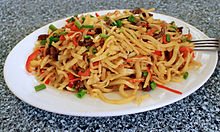
Tsuivan (Mongolian: Цуйван) is a Mongolian noodle dish with meat and vegetables. It is one of Mongolia's most popular dishes.
There are two common ways to make the noodles. The first way is to roll the dough into a circle, oil the dough, roll the dough back onto itself, and steam it. After steaming, the cooked dough can be cut into strips. The other way is to roll the dough into a circle, fry it like a pancake, and then to cut it into strips.
These noodles are then added onto stir-fried meat (beef or mutton--mutton is more traditional) and vegetables (usually at the most basic carrots and onions). The noodles are often placed on top of the stir-fry with some water added, to soften the noodles with steam (in the case of the fried dough), or to cook them (in the case of undercooked steamed noodles).
Etymology
The word tsuivan derives from the Chinese 炒餅 (chǎobǐng), literally "fried shredded pancake"
References
- Tsuivan recipe, Three Camel Lodge, Mongolia
- Bori. "Цуйван | Galtogoo". Retrieved 2023-03-27.
- Tsuivan, All Mongolian Recipes
- Osornamjim, Sukhbaatar (1997). Монгол хэлний харь үгийн толь. p. 209.